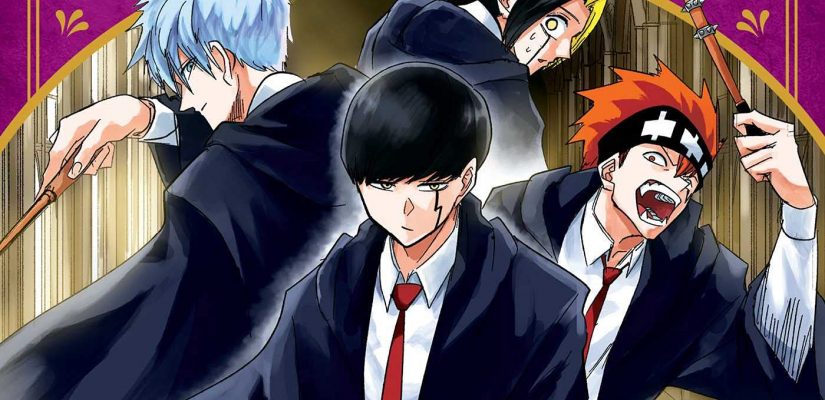
Harry Potter is synonymous with magical school fantasy, defining the genre for an entire generation. However, one criticism I increasingly see is that it’s more about maintaining/restoring the status quo rather than trying to effect a real and lasting positive societal change that goes beyond defeating evil. While it’s a bit unfair to pigeonhole the books in this way, it’s also hard to deny that Harry Potter eschews structural issues about the world it presents, and that this is not all that uncommon in similar fiction.
That’s why the last place I expected to see a more boldly progressive take on the inequities of a wizarding society would come in the form of a comedic shounen manga called Mashle: Magic & Muscles.
I want to be clear that Mashle is not some leftist manifesto that proudly announces its overthrowing of capitalist oppressors. Jack London’s The Iron Heel this most certainly is not. But when you compare how Mashle and Harry Potter tackle the same premise, the differences stand out.
Both protagonists, Harry Potter and Mash Burnedead, enroll in a magic school where they must deal with being outsiders while also being under the benevolent watch of the school’s wise, old leader. However, whereas Harry Potter at the start is simply inexperienced with wizardry but has potential for greatness, Mash is completely incapable of magic. In order to get through his classes and achieve his goal of becoming Divine Visionary (a motivation from the beginning unlike Harry’s initial uncertainty), Mash has to overcome his disadvantage through sheer physical power.
The contest between Mash’s muscles and the occult abilities he contends with is generally played for laughs, but there’s another layer to that contrast. Sure, it’s funny to see his “magic” be activating different muscle groups and his “spells” amount to suplexes and punches to the face. Yet, because he is doing this purely through his human physiology, his victories over other students both read differently from Harry’s accomplishments and are received differently by the very mages he bests. By beating them without magic, Mash makes his opponents realize on some level that they are themselves victims—because they get drawn into the incessant and blinding obsession with hierarchy and power. The problem is not exclusive to any specific group of rogue ne’er-do-wells, it’s systemic.
Mash himself is not a sharp mind capable of bold leadership. He’s from that Goku/Luffy/Saitama lineage where thinking is not their strong suit. He merely wants to live a comfortable life with his grandfather, but he’s forced to attempt the impossible and become the top of a magical school because his world despises the weak. Mash defies his society in multiple ways: upending what strength means, as well as rejecting the notion that those with less deserve less.
Around Chapter 65, the “Voldemort” of the series is revealed, as are Mash’s true origins. While not quite the same as the concept of horcruxes relative to Harry and Voldemort, Mash and the main villain share a similar connection. Mash turns out not to be the everyman he assumed himself to be, but that doesn’t change the fact that he uses his particular skills to upend people’s preconceived notions. The difference between Harry discovering the magic within and Mash working to overcome the magic he lacks remains stark.
That all said, it’s hard to think of Mashle as being in the same league as Harry Potter when it comes to the ability to capture people’s imaginations. It simply doesn’t have that sense of wonder that makes Harry Potter so enduring; instead, it goes for lots of comedy, absurdity, and the occasional cool fight. Spiritually, it’s cut from the same cloth as Kinnikuman and early Dragon Ball, during the kid Goku era. I have trouble seeing children running around pretending to be Mash because Mashle doesn’t really provide for that.
Mashle and Harry Potter both operate under the idea that the power of love is in a category of its own. But where Harry Potter‘s is either abstract in its sentimentality or all too literal, Mashle‘s manifests in a grandfather taught the value of human life, and a grandson who strives to live up to that ideal through both word and deed.








